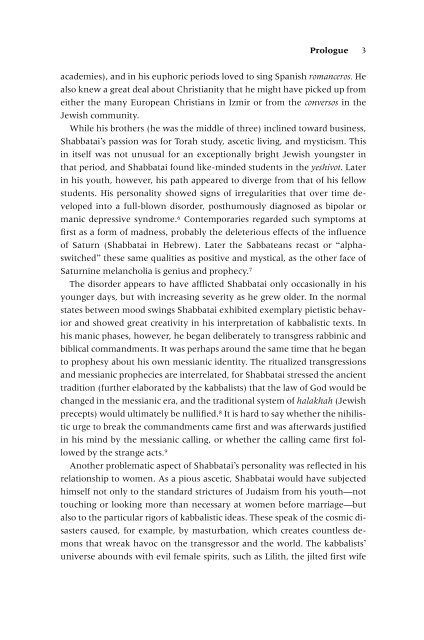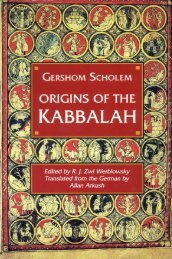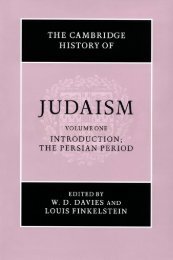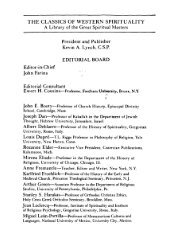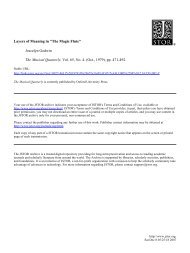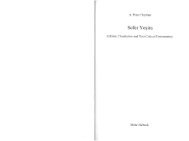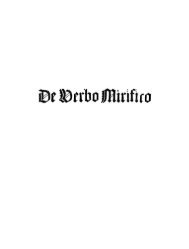You also want an ePaper? Increase the reach of your titles
YUMPU automatically turns print PDFs into web optimized ePapers that Google loves.
Prologue 3<br />
academies), and in his euphoric periods loved to sing Spanish romanceros. He<br />
also knew a great deal about Christianity that he might have picked up from<br />
either the many European Christians in Izmir or from the conversos in the<br />
Jewish community.<br />
While his brothers (he was the middle of three) inclined toward business,<br />
Shabbatai’s passion was for Torah study, ascetic living, and mysticism. This<br />
in itself was not unusual for an exceptionally bright Jewish youngster in<br />
that period, and Shabbatai found like-minded students in the yeshivot. Later<br />
in his youth, however, his path appeared to diverge from that of his fellow<br />
students. His personality showed signs of irregularities that over time developed<br />
into a full-blown disorder, posthumously diagnosed as bipolar or<br />
manic depressive syndrome. 6 Contemporaries regarded such symptoms at<br />
first as a form of madness, probably the deleterious effects of the influence<br />
of Saturn (Shabbatai in Hebrew). Later the <strong>Sabbatean</strong>s recast or “alphaswitched”<br />
these same qualities as positive and mystical, as the other face of<br />
Saturnine melancholia is genius and prophecy. 7<br />
<strong>The</strong> disorder appears to have afflicted Shabbatai only occasionally in his<br />
younger days, but with increasing severity as he grew older. In the normal<br />
states between mood swings Shabbatai exhibited exemplary pietistic behavior<br />
and showed great creativity in his interpretation of kabbalistic texts. In<br />
his manic phases, however, he began deliberately to transgress rabbinic and<br />
biblical commandments. It was perhaps around the same time that he began<br />
to prophesy about his own messianic identity. <strong>The</strong> ritualized transgressions<br />
and messianic prophecies are interrelated, for Shabbatai stressed the ancient<br />
tradition (further elaborated by the kabbalists) that the law of God would be<br />
changed in the messianic era, and the traditional system of halakhah (Jewish<br />
precepts) would ultimately be nullified. 8 It is hard to say whether the nihilistic<br />
urge to break the commandments came first and was afterwards justified<br />
in his mind by the messianic calling, or whether the calling came first followed<br />
by the strange acts. 9<br />
Another problematic aspect of Shabbatai’s personality was reflected in his<br />
relationship to women. As a pious ascetic, Shabbatai would have subjected<br />
himself not only to the standard strictures of Judaism from his youth—not<br />
touching or looking more than necessary at women before marriage—but<br />
also to the particular rigors of kabbalistic ideas. <strong>The</strong>se speak of the cosmic disasters<br />
caused, for example, by masturbation, which creates countless demons<br />
that wreak havoc on the transgressor and the world. <strong>The</strong> kabbalists’<br />
universe abounds with evil female spirits, such as Lilith, the jilted first wife


